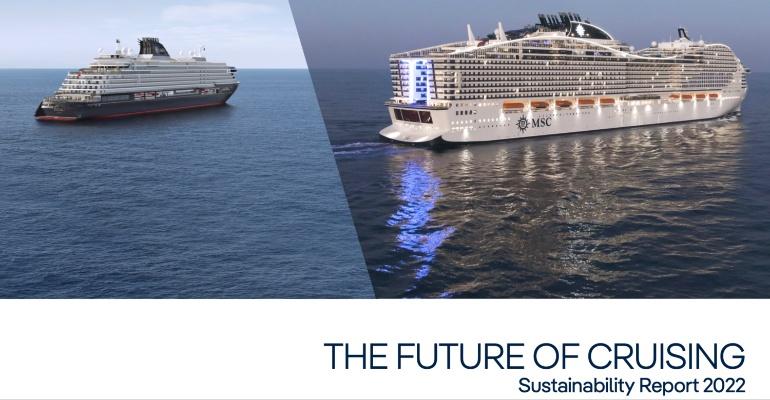We often hear their pledges and promises, but are cruise lines meeting their objectives when it comes to sustainability? Sara Macefield hears about the challenges they face
Sustainability has become the buzzword in cruising circles as the industry pushes forward with ambitious plans to clean up its act and silence critics.
Clia has been leading the way with policies and reports on environmental stewardship, but several lines have joined the push towards a cleaner cruising future, as set out in reports reviewing their progress and setting out their objectives.

Filling up with renewable diesel. Image: Royal Caribbean
Royal Caribbean Group
The Group unveiled Destination Net Zero covering its three brands – Royal Caribbean International, Celebrity Cruises and Silversea – two years ago outlining goals for continued carbon emissions reduction, sustainable tourism and waste management.
Cited as a comprehensive strategy for decarbonisation, a company spokesperson added: “This charts a course to achieve net zero emissions by 2050 and we are committed to delivering a net zero ship by 2035, something we are incredibly proud of and on track to achieving.”
Developments include new energy efficient and alternative-fuel vessels, such as LNG (liquefied natural gas) ships, notably Royal Caribbean International’s new Icon of the Seas. The line also recently conducted a bio-fuel trial on Symphony of the Seas.
Sister brand Silversea became the first tour company to gain certification in environmental management in the Galapagos Islands after diverting waste out of the archipelago to be recycled and processed elsewhere. Its newest ship, Silver Nova, runs on LNG and has been hailed as the most sustainable luxury craft with advanced hybrid technology utilising fuel cells and thus emitting zero harmful emissions while in port – claimed to be an industry first.

The new generation of Prima-class ships will be modified to be greener. Image: NCL
Norwegian Cruise Line Holdings
The parent company of NCL, Oceania Cruises and Regent Seven Seas Cruises recently unveiled a revamped “climate action strategy” outlining greenhouse gas (GHG) targets to achieve its stated aim of net zero by 2050. This involves reducing emissions from its overall operation by 10 per cent by 2026 and 25 per cent by 2030.
Two of its forthcoming Prima-class ships, to be delivered in 2027 and 2028, are to be modified to take green methanol in future. Since last year, the company has carried tests of biofuel blends on numerous ships and by the end of this year expects more than 20 per cent of its fleet to have tested and operated on biodiesel blends.
Jessica John, NCL Holdings vice-president of ESG (environmental, social and governance), investor relations and corporate communications, said the company had been encouraged by “significant progress” and momentum behind decarbonisation efforts, but she cautioned: “Fundamental challenges continue to exist for the cruise industry to fully decarbonise by 2050.”

MSC recently operated the world’s first net zero emissions cruise. Image: MSC Cruises
MSC Cruises
The Geneva-based line is forging ahead to strike out greenhouse gas (GHG) after operating the world’s first net zero emissions cruise on MSC Euribia in June.
Recently-released data from the four-day sailing showed the line’s new flagship surpassed performance expectations, saving an additional 43 tonnes of fuel. Its boilers were also not required as heating and hot water was produced via waste heat from the engines.
MSC hailed the voyage as a significant achievement, proving that net zero GHG cruising was possible now – well ahead of the industry’s 2050 target, but stressed the key to this lay with sufficient renewable fuels being produced at the scale needed by the industry.

Water refill stations on Virgin Voyages ships. Image: Virgin Voyages
Virgin Voyages
The line has followed up its second annual Impact Report in June with initiatives that have included setting interim CO2 reduction goals, having shore power capability installed on Resilient Lady and Brilliant Lady, with plans to retrofit Valiant Lady and preparing for a biofuel pilot test in Europe.
The line’s senior director of social impact and sustainability, Jill Stoneberg, stressed that consistency was key. “We work in a dynamic environment that’s constantly changing and while progress can feel slow at times, focusing on short-term wins and having patience with the strategic goals help move the needle along,” she added.

Hurtigruten’s Sea Zero concept visualisation. Image: VARD Design
Hurtigruten
In June, the Norwegian line unveiled plans for its first zero-emission ship, using battery power, retractable sails, solar panels and artificial intelligence manoeuvring. It’s set to launch in 2030. It also aims to transform its entire fleet to zero emissions and two of its ships have been upgraded to battery-hybrid power, with a third following, while five others are being fitted with technology to cut emissions.
Hurtigruten’s ESG (environmental, social and governance) vice-president Rikke Jørgensen said the company had made substantial investments to achieve sustainability targets.
“This year alone, we channelled 65 million euros towards green upgrades throughout our fleet,” she added. “Our ongoing commitment to sustainability, fostered by a shared culture and focus across departments, gives us strong confidence that we will achieve our objectives.”
https://magazine.cruise-adviser
Tags: Sara Macefield, Sustainability, Rikke Jørgensen, Cruises
